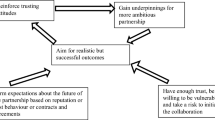Abstract
This article draws lessons from experience at UNESCO and Eidos pertinent to the issues of developing East-West Partnership in education. For the past 60 years, UNESCO’s mission has been to promote international co-operation. It has been very much involved in promoting intellectual co-operation among the professional leaders in education. Eidos is a consortium linking three Queensland Government Departments and seven of its universities that are committed to building collaborative research and policy capacity and to ensuring that research informs educational policy and practice. The experience of UNESCO indicates that to be successful, partnerships must focus on shared goals and mutual advantages. Partners must be prepared to meet their commitments and abide by agreed standards, and there needs to be effective monitoring of performance. The Eidos experience confirms that maintaining partnerships is not easy in a highly competitive environment, but that we must harness the collective expertise of researchers and policy makers if we are to develop innovative solutions to the complex problems facing our education systems.
Similar content being viewed by others
References
Campbell W.J, Baikaloff N., Power C.N. (2006). Towards a global community: Educating for tomorrow’s world. Springer, Dorchrecht, NL
Huong P.L., Fry G.W. (2002). The emergence of private higher education in Vietnam: Challenge and opportunities. Educational Research for Policy and Practice, 1(2):127–141
Kennedy K. (2003). Higher education governance as a key policy issue in the 21st century. Educational Research for Policy and Practice, 2(10):55–70
Lee M. (2004). Global trends, national policies and institutional responses: Restructuring higher education in Malaysia. Educational Research for Policy and Practice, 3(1):31–46
OECD (2005). Education at a glance. Paris: OECD.
Power C.N. (1990). Higher education indicators: An exercise in interpretation. International Journal of Educational Research, 14(4):353–361
Power C.N. (1997). Learning: A means or an end? A look at the Delors report and its implications for educational renewal. Prospects, 28(2):187–199
Power, C. N. (2002). Creating partnerships in research on pedagogy and classroom practice. Educational Research Association of Singapore Conference, November, 2002.
Samoff, J. (1994). Coping with crisis: Austerity, adjustment and human resources. London: Cassell & UNESCO.
Saul J.R. (2005). The collapse of globalisation. Penguin Books, London
UNESCO (1996). Learning: The treasure within. Paris: UNESCO Publishing.
UNESCO (1998). Higher education in the 21st century: Vision and action. World Conference on Higher Education, UNESCO, Paris, 5–9 October.
Webb, M. (1997). Europe in a period of mutation and change—the role of higher education. In A European Agenda for Change for Higher Education. Paris: UNESCO-CRE.
Winter A., Wiseman J., Muirhead B. (2005). Beyond rhetoric: University-community engagement in Victoria. Eidos, Brisbane
World Bank (1999). Knowledge for development. Washington: World Bank.
Yee A.H. (1995). East Asian higher education: Transition and transformation. Pergamon, Oxford
Zhou M.-S., Shi C.-M. (2003). Trends in international educational services: Implications for China after entering WTO. Educational Research for Policy and Practice, 2(10):41–54
Author information
Authors and Affiliations
Corresponding author
Rights and permissions
About this article
Cite this article
Power, C. East–West partnerships: lessons from UNESCO and Eidos. Educ Res Policy Prac 5, 255–264 (2006). https://doi.org/10.1007/s10671-006-9013-7
Accepted:
Published:
Issue Date:
DOI: https://doi.org/10.1007/s10671-006-9013-7




